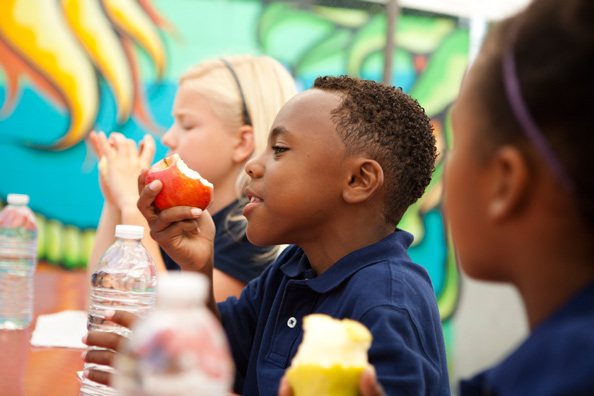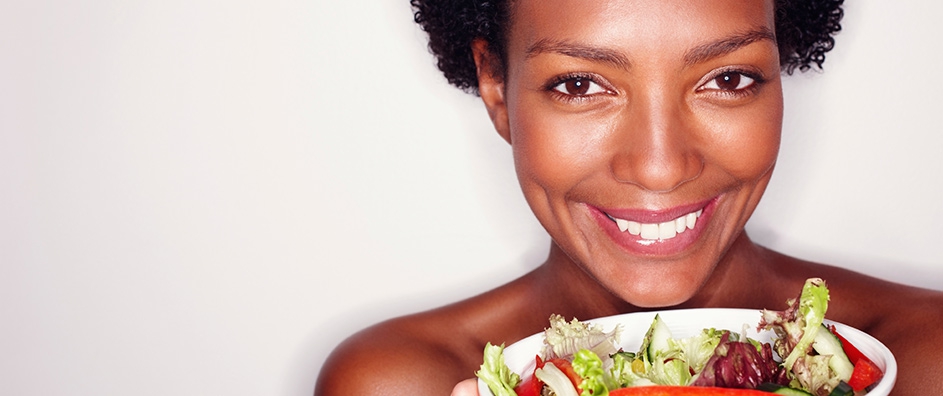The views expressed in our content reflect individual perspectives and do not represent the authoritative views of the Baha'i Faith.
Between material things and spiritual things there is a connection. The more healthful his body the greater will be the power of the spirit of man. – Abdu’l-Baha, Star of the West, Vol. VIII, No. 18, p. 231.
Let’s consider some spiritual components of our diets. Do you think our physical actions – what we do and what we eat – affect our spiritual growth? Is that possible? Abdu’l-Baha certainly seems to indicate, in the quote above, that our bodies and our spirits have a profound connection. Multiple medical research studies have come to the same conclusion—that the body/mind connection can have enormous influence over our well-being, in every aspect.
The Baha’i writings encourage virtues such as moderation, frugality, and simplicity in our physical lives—but you don’t have to live in sack cloth or work on a farm to embody those virtues. Abdu’l-Baha states:
Economy is the foundation of human prosperity…. It is more kingly to be satisfied with a crust of stale bread than to enjoy a sumptuous dinner of many courses, the money for which comes out of the pockets of others. The mind of a contented person is always peaceful and his heart at rest. How happily such a man helps himself to his frugal meals! How joyfully he takes his walks, how peacefully he sleeps! – Abdu’l-Baha, Baha’u’llah and the New Era, p. 102.
Baha’is try to cultivate many positive character attributes and virtues, including gratitude and mindfulness. How do we practice gratitude and mindfulness with food? We can express thankfulness for our sustenance, and we can become more aware of the food choices we make, whether shopping, preparing our meals, eating at home or in a restaurant.
 First, we can take a few moments to feel grateful, to think of the connections needed to have this food come to us. This doesn’t need to become a ritual—the Baha’i teachings discourage dogma and rituals–but instead, we want to recognize all that it takes to supply us with food, recognizing the bounty of having enough to eat in a world where many do not. Abdu’l-Baha often prayed at the beginning of a meal. When we stop for a moment in gratitude, we remember God’s bounty, and honor what we’ve received.
First, we can take a few moments to feel grateful, to think of the connections needed to have this food come to us. This doesn’t need to become a ritual—the Baha’i teachings discourage dogma and rituals–but instead, we want to recognize all that it takes to supply us with food, recognizing the bounty of having enough to eat in a world where many do not. Abdu’l-Baha often prayed at the beginning of a meal. When we stop for a moment in gratitude, we remember God’s bounty, and honor what we’ve received.
Mindfulness, that virtue so closely related to the connection between our intellects and our spirits, can also help us when it comes to choosing our food. When we educate ourselves about the carbon impact of the food we eat; about the health consequences of our food choices; and about the sustainability of our selections, we each contribute what we can to the world’s ability to feed its peoples.
Finally, how do we put these principles into action? Baha’u’llah has given us guidance, to strive beyond merely reading or thinking about ways to change. He writes:
It is incumbent upon every man of insight and understanding to strive to translate that which hath been written in reality and action. – Tablets of Baha’u’llah, p. 165.
You may ask: What can I do? What can one person do? Does it really make a difference? Yes, it does make a difference! First, we need to put spiritual principles into action. This is a process. We don’t have to be perfect. We simply need to make a start. Any small change we make does matter—both in the outside world, and inside our hearts and souls.
Try to think of these changes as a positive process towards a goal, not as a goal in themselves, or worse, as some kind of deprivation. After all, when we pray and meditate, we know we are “depriving” ourselves of time to relax and play. Yet we know that this giving up of a material thing will result in greater benefit, and then we do it for that reason. And so it goes with gradually changing our food habits. Building healthier bodies means building healthier communities, a healthier environment and a healthier planet. Even more, when we make the effort it results in unity with other altruistic souls willing to change their actions for the betterment of the world, and not to remain complacent and self-satisfied.
To make a start, we can pray and study the Baha’i teachings about this topic, consult with our friends and family, reflect on the part we play, and then take some action which moves us. No one ‘right’ way exists–simply make a start to change your habits, and your soul and your conscience will guide you to continue the journey.
















Comments
Sign in or create an account
Continue with Googleor